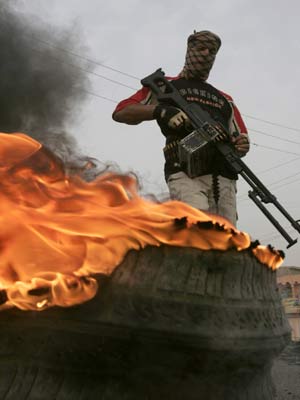The British troops stationed outside the city have reportedly offered air surveillance, while stayed away from ground operations.
In Baghdad, Sadr's Mahdi Army militiamen battled US-backed Iraqi forces in their sprawling Shiite bastion of Sadr City neighborhood on the east of the capital.
Up to 20 people were killed and 115 others were wounded during clashes which started after midnight and continued sporadically during the day.
In the afternoon, fierce clashes erupted between the Mahdi Army and Iraqi security forces in two other neighborhoods.
In addition, barrages of mortar and rocket shellings rocked different areas of the city, including the heavily fortified Green Zone, killing at least 10 people and wounding dozens, including three Americans.
In the city of Amara, capital of Maysan province southwest of Baghdad, gunmen attacked an Iraqi Army patrol, killing five soldiers and burning eight military vehicles.
Sadr has called on his followers to stage a nation-wide civil disobedience in protest of the pursuing effort by the government. He threatened to take further actions if the attacks on his people continue.
His ceasefire since last August contributed to the security improvement.
The US military welcomes his move, but says some of his followers have not followed his order. It also accuses Iran of funding, arming and training the breakaways.
Maj. General Kevin J. Bergner, a US military spokesman, said Wednesday that the operations are designed to tackle criminals rather than the Mahdi Army.
"The actions are not against (the Mahdi Army). It is the government of Iraq taking responsibility and acting to deal with criminals on the streets," the spokesman told reporters.

A fighter from the Mahdi Army militia stands guard near a burning tyre on a road in Baghdad's Sadr City March 26, 2008. Fourteen people were killed and more than 140 wounded in clashes between security forces and Shi'ite militants in Baghdad's Sadr City slum, a medical source said on Wednesday.(Xinhua/Reuters Photo)